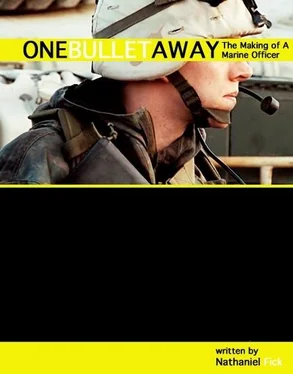Three weeks later, I made the trip to Portsmouth. The office was hidden in a nondescript professional center. An efficient receptionist greeted me and sat me on a couch. The waiting room was neutral, softly lit, almost corporate — not what I expected. I stood when the door to the inner office opened. Captain Ettien was trim and fit, looking in his dress blues like every recruiting poster Marine in my mind.
“So you think you have what it takes to be an officer in my Corps.” It was a statement, almost an accusation, not a question.
My first hurdle would be passing the Marines’ physical fitness test. Three hundred was a perfect score, and officer candidates were expected to score better than 275. There were three events: pull-ups, crunches, and a three-mile run. A score of 300 required doing twenty dead-hang pull-ups without dropping off the bar, followed by one hundred crunches in under two minutes, and then completing the run in under eighteen minutes. Like a triathlon, none of the individual events is especially difficult, but in combination they test overall fitness. I had played football and lacrosse in high school and was a strong bicycle racer at Dartmouth, so I left Portsmouth that afternoon intent on conquering the fitness test.
Captain Ettien greeted me on my next visit by asking in what order I’d been training for the three events. Grateful that he was taking my preferences into account, I told him I relied on pull-ups, crunches, run.
“Great.” He grinned. “Then we’ll start you with the run, followed by crunches, and then pull-ups.” It was my introduction to the Marine Corps way.
I must have blanched, because he added that he’d come on the run to motivate me. Two minutes later, I sprinted out of the parking lot with Captain Ettien behind me at the wheel of a government van, honking the horn and shouting to pick up the pace. I ran three miles in 17:30. Moving over to the grass, I lay on my back with the captain on my feet. At his whistle, I started crunching. Ninety-eight, ninety-nine, one hundred. Ten seconds to spare. Another perfect score. I was rolling. We moved over to the pull-up bar. Every breath formed a cloud of condensation. My body was sore from the run and the crunches, but my arms felt good. Jumping up to the bar, I started curling my chin over the metal pole as Captain Ettien counted aloud.
“Thirteen, fourteen, fourteen, fourteen.” What am I doing wrong? “Stop kipping — fourteen, fourteen.” What the hell is kipping?
By now, I’d done twenty pull-ups but his count stuck at fourteen. My arms shook, and despite the cold, sweat dripped into my eyes. I dropped off the bar, buckled at the knees, and poured my breakfast into the grass. When the heaves stopped, I asked, “What’s kipping, and why did you stop counting at fourteen?”
“Swinging your body back and forth. You have to move up and down in a straight line. I’m tempted to give you one for effort because of the puke.” Ettien paused and looked at his clipboard. “Two-seventy — not bad. Just keep working on it and you’ll qualify for OCS.”
By the time I stood in front of the color sergeant that morning, I was a machine. I could run three miles in sixteen minutes and do twenty-five dead-hang pull-ups. Unfortunately, OCS rarely tested what we’d already trained for.
“This morning you will do the log run. Give me a squad to demonstrate.”
Twelve candidates jumped up and jogged to the front of the group. In unison, they snapped to parade rest.
“Pick up the log.”
The candidates hoisted a full-size telephone pole onto their shoulders. It was twenty feet long and weighed six hundred pounds. The pole reeked of creosote and rubbed off brown on their hands and shoulders.
“Now run,” the color sergeant ordered.
They trotted in a circle around the field.
“See, it’s simple. Even you wankers should be able to figure this one out. Each squad grab a log. Catch me.” He took off down the trail.
We strategized. “Tallest to shortest — otherwise the short guys won’t be bearing any of the weight. Tall guys in front will keep the pace high.” Dave and I were the tallest guys in our squad, so he stood at the front of the pole, with me a foot behind.
A dozen squads of a dozen men each struggled off down the trail, looking like millipedes beneath their logs. Legs moved quickly, but progress was slow. We slopped over muddy roots and banged between trunks. Once or twice, the log threatened to roll off our shoulders and crush our feet. I wrapped one arm up over the log and used the other to wipe sweat from my eyes.
Ahead of us, the color sergeant bounced along in his running shoes and white tank top, bemoaning the future of the Marine Corps. “Your Corps has been around for two hundred twenty-three years, right? Not a bad run. A respectable try, really. The Army will pick up your slack.” He reached a fork in the trail and turned left.
“He’s headed toward the ford. I wonder how we’re gonna do that.” The voice came from behind me, where candidates were struggling with the weight and the slippery footing.
The ford was a deep pool of stagnant water sitting in the middle of the trail. Stopping at the water’s edge, the instructor picked up a rock the size of a bowling ball. He waited for the squads to pant into position all around him before heaving it into the ford. When it splashed into the water and sank out of sight, four little heads popped up.
“You’re doing a good job, so I’m showing you where the snakes are. Go get wet.”
We joined the snakes in the ford, splashing out to the deep water and swimming next to the log like tugboats pushing a barge. Our boots filled with water and threatened to drag us to the bottom. I had grown up on Chesapeake Bay, a strong swimmer, but being trapped underwater was my private terror. A short candidate at the back of the log was yelling encouragement when his hand slipped off the muddy pole and the words turned to gurgles as his head went under. I hardly heard him because I was focused on keeping my own hands on the log and my own head above water.
“Let’s go, fellas. Just a little farther. Good job.” Ahead of me, Dave was pushing the log and looking back at the rest of the squad. He was soaked, red-faced, and squinting to see. I could tell he was in pain, but he was turning his energy and attention outward, pulling the rest of the squad behind him.
An hour after we’d started, Dave led us back onto the sunny field where we had begun. He was singing cadence, and we echoed with all the breath we had left. “Born in the woods. Raised by a bear.” Dave jogged easily under the log. “Double set of dog teeth. Triple coat of hair.” The pain started to subside for me, too. “Two magazines and my M-16. I’m lean and mean.” By suffering together, we could spread the hardship around until it almost disappeared. “I’m a U.S. Marine.”
Olds was waiting to march us back to the squad bay. “Cut that trash out. You ain’t Marines.” I thought I saw a glimmer of satisfaction beneath his dismissal. “PT showers. You have four minutes. We’re already late for chow.” It wasn’t even seven A.M.
PT showers were one of OCS’s many small indignities. They were cold, soapless soaks with forty of your closest friends. The staff turned on all the nozzles in our communal bathroom while the platoon stripped. Then we walked in single file, “nuts to butts,” past the spraying shower-heads. It was enough water to turn dusty limbs muddy, but never enough to get clean. We toweled off, dressed, and marched across the parade deck, still breathing hard from the log run.
The platoon marched in three columns of about a dozen candidates each. In addition to marching everywhere we went, we usually spent an hour or two each evening on the parade deck. Olds called it “driving the bus.” We would march from one end to the other, about-face, march back, and repeat. We carried M-16s on our right shoulders, gripping the buttstock with a hand extended parallel to the deck. In the beginning, Sergeant Olds had called our cadence, but he slowly shifted the responsibility to us. It wasn’t words so much as a haunting wail, rising and falling like a plaintive southern spiritual. But the wail had a beat, and our heels struck the pavement in unison. Halfway across the parade deck on our way to the chow hall, Olds pulled me from the formation to take over calling the cadence.
Читать дальше












